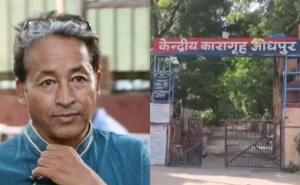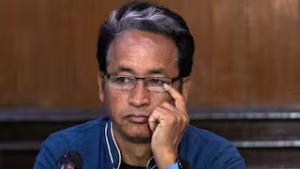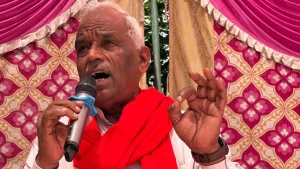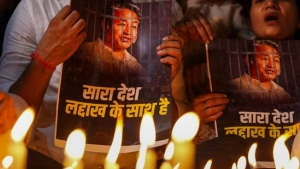Rajasthan – A Lok Sabha MP from Rajasthan was turned away from Jodhpur Central Jail on Tuesday evening after authorities denied him permission to meet detained Ladakhi activist Sonam Wangchuk. Amra Ram, the MP from Sikar and a prominent Communist Party of India (Marxist) leader, described the scene outside the prison as resembling a “battlefield” with heavy security deployment preventing any access to the detained activist.
Leading a delegation of his party members to support Sonam Wangchuk, Ram encountered extensive security measures including high barricades, hundreds of helmeted police officers wielding batons, and threats of water cannon deployment. The delegation was completely blocked from approaching the facility, highlighting the stringent restrictions imposed around the detained activist.
Authorities Cite No Permission for Meeting

When the delegation attempted to gain access, they contacted the jail superintendent by telephone, only to receive a terse response stating “No permission.” Ram, who serves as a Polit Bureau Member of the CPM and National Vice President of All India Kisan Sabha, criticized this refusal as suppression of constitutional rights under the pretext of the National Security Act.
The MP emphasized that Sonam Wangchuk should not be treated as a terrorist, questioning why basic visiting rights were being denied. “Wangchuk is not a terrorist that even a meeting with him should be denied. The government should clarify when and under what conditions it would allow a meeting with Wangchuk,” Ram stated emphatically.
Background of Detention Under NSA

Sonam Wangchuk was transferred to Jodhpur Central Jail following his detention in Leh on Friday under the National Security Act. Authorities alleged that the activist instigated violent protests that occurred on September 24. The detention represents an escalation in the government’s response to the ongoing movement in Ladakh.
The renowned activist has been leading a sustained campaign demanding full statehood for Ladakh and protections under the Sixth Schedule of the Indian Constitution. These demands have garnered significant support among Ladakh’s population, who seek greater autonomy and constitutional safeguards for their region.
Delegation Waits Hour Before Departure
The delegation led by MP Amra Ram waited approximately one hour outside the prison premises, hoping authorities would reconsider their position. During this time, Ram formally submitted a written letter to the jail superintendent requesting permission to meet Sonam Wangchuk.
However, the response proved disappointing. Authorities returned the original letter with a notation stating, “The original is returned, and it is written that, as per rules, your request is rejected.” This formal rejection underscored the government’s firm stance on preventing any meetings with the detained activist.
Democratic Rights Violation Alleged


Ram characterized the denial as extending beyond personal rights violations. “The move to prevent the delegation from meeting Wangchuk is not only a violation of Sonam ji’s personal rights, but is also a direct attack on the democratic values of the entire nation,” the MP asserted.
The CPI(M) leader drew attention to what he termed a “double standard” in the government’s treatment of Sonam Wangchuk. He noted that when the activist “was a staunch supporter of the BJP, he was called a ‘patriot’ and a ‘great man.'” However, the situation changed dramatically when Sonam Wangchuk began demanding fulfillment of the BJP’s 2019 election promises to Ladakh.
BJP’s Unfulfilled Promises to Ladakh
According to Ram, Sonam Wangchuk is simply reminding the ruling party of commitments made during the 2019 elections, including full statehood for Ladakh, establishment of a strong legislature, and protection under the Sixth Schedule. Instead of dialogue, the government has responded with detention under the draconian National Security Act.
Also Read: Ladakh Situation Update: Explosive Curfew Relaxation Amid Heavy Security
“This double standard brings shame to the political morality of the nation,” Ram declared, emphasizing that “Sonam Wangchuk’s life is a living example of service to the nation.” The MP’s statement highlighted the irony of a celebrated environmental activist and innovator being treated as a security threat.
Heavy Security Deployment Continues
Sources confirmed that tight security arrangements have been maintained outside Jodhpur Central Jail since Sonam Wangchuk arrived at the facility. Additional police forces have been deployed, and barricades extend well beyond the main gate to create multiple security perimeters.
Anyone attempting to pass through the area faces questioning by security personnel. Authorities have installed CCTV cameras both on the prison premises and surrounding areas to monitor all activity. This extensive surveillance infrastructure demonstrates the government’s determination to prevent any unauthorized contact with Sonam Wangchuk.
Implications for Democratic Expression

The denial of visiting rights to an elected Member of Parliament raises questions about democratic norms and the application of the National Security Act. Ram characterized the Centre’s actions as “repressive” and presenting “a clear picture of the Centre’s dictatorship.”
The incident has drawn attention to broader concerns about how the government handles dissent and political activism. Sonam Wangchuk’s detention and the subsequent restrictions on access have become symbolic of tensions between citizen demands for constitutional rights and government security concerns.
Conclusion
The refusal to allow a parliamentary delegation to meet Sonam Wangchuk at Jodhpur Central Jail has intensified debate about democratic freedoms and the appropriate use of security legislation. As the activist remains in detention, questions persist about when authorities will permit meetings and under what conditions the stalemate might be resolved.

